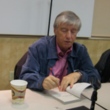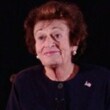The boy on the wooden box : how the impossible became possible...on Schindler's list
(Book)
JB LEYSON L
1 available
JB LEYSON L
1 available
Copies
| Location | Call Number | Status | Due Date |
|---|---|---|---|
| Central - Kids Biography | JB LEYSON L | Available | |
| Glencarlyn - Kids Biography | JB LEYSON L | Available | |
| Westover - Kids Biography | JB LEYSON L | Checked Out | June 21, 2025 |
Description
More Details
Notes
Subjects
Jewish children in the Holocaust -- Poland -- Kraków -- Biography -- Juvenile literature.
Jews -- Poland -- Narewka -- Biography -- Juvenile literature.
Leyson, Leon, -- 1929-2013 -- Juvenile literature.
Narewka (Poland) -- Biography -- Juvenile literature.
Nazi concentration camp inmates -- Poland -- Płaszów -- Biography -- Juvenile literature.
Płaszów (Concentration camp) -- Juvenile literature.
Schindler, Oskar, -- 1908-1974 -- Juvenile literature.
World War, 1939-1945 -- Jews -- Rescue -- Juvenile literature.
Excerpt
Similar Titles From NoveList
Similar Authors From NoveList
Published Reviews
Booklist Review
This powerful memoir of one of the youngest boys on Schindler's list deserves to be shared. Leon Leyson grew up in Poland as the youngest of five children. As WWII breaks out, Leyson's ingenuity and bravery, combined with the kindness of strangers and a bit of serendipity, save his life, time and again. The storytelling can at times meander, and the various reflections of his life in Poland during the war can result in a certain patchiness, but Leyson's experiences and memories still make for compelling reading about what it was like to suffer through the Holocaust. This memoir is a natural curriculum addition to WWII units for upper-elementary- and middle-school readers. Be sure to have additional materials on hand about Oskar Schindler, as readers will want to do more research into Leyson's story.--Thompson, Sarah Bean Copyright 2010 Booklist
Publisher's Weekly Review
Leyson, who died in January at age 83, was No. 289 on Schindler's list and its youngest member. He was just 13 when Leyson's father convinced Oskar Schindler to let "Little Leyson" (as Schindler knew him) and other family members find refuge in the Emalia factory; Leyson was so small he had to stand on a box to work the machinery. Leyson and his coauthors give this wrenching memoir some literary styling, but the book is at its most powerful when Leyson relays the events in a straightforward manner, as if in a deposition, from the shock of seeing his once-proud father shamed by anti-Semitism to the deprivation that defined his youth. Schindler remains a kindly but enigmatic figure in Leyson's retelling, occasionally doting but usually distant. Leyson makes it clear that being "Schindler Jews" offered a thread of hope, but it never shielded them from the chaos and evil that surrounded them. Readers will close the book feeling that they have made a genuinely personal connection to this remarkable man. Ages 9-14. Agent: Peter Steinberg, the Steinberg Agency. (Aug.) ? (c) Copyright PWxyz, LLC. All rights reserved.
School Library Journal Review
Gr 5-8-Leyson describes his childhood prior to the Nazi invasion of Poland as "a world defined by the love and warmth of family." In 1938, he moved with his mother and four older siblings from a small village to join his father, who was working in the city. But soon after, everything changed as the Nazis "tightened their grip on Krakow." Through luck, skill, and tenacity, Leyson's father became one of Oskar Schindler's first Jewish workers and managed to secure a place on his notorious list for his wife and children. Throughout his six years of immense suffering, including in the Plaszow work camp, Leon was convinced that his luck would eventually run out. But Schindler made sure that didn't happen. In 1949, at age 19, Leon immigrated to America with his parents. He served in the U.S. army during the Korean War, went to school on the GI Bill, and taught high school in southern California for 39 years. But he rarely spoke about his wartime experience until Steven Spielberg's film was released. As Leyson explained: "Maybe I hadn't really been ready to speak about my experiences.or maybe people hadn't really been ready to listen, or maybe both." But for the next 18 years, he spoke to countless church, synagogue, and school groups and was encouraged to write his story. He died in January 2013 without knowing that his book would be published. Black-and-white photographs of the Leyson family before and after the war are appended. This powerful account succeeds at putting a face and a name, and a fully developed story, to one of the nearly 1200 Jews who were saved by Oskar Schindler. Leyson's clear, concise, and accessible narrative is profound and inspiring.-Rachel Kamin, North Suburban Synagogue Beth El, Highland Park, IL (c) Copyright 2013. Library Journals LLC, a wholly owned subsidiary of Media Source, Inc. No redistribution permitted.
Horn Book Review
Leon Leyson (born Leib Lejzon in 1929) acknowledges that he was "an unlikely survivor of the Holocaust," saved from extermination by his father's lucky place in Oskar Schindler's Krakow factory. Leyson's account of his childhood in pre-war Poland and under the Nazi occupation stands out for its brisk and unsentimental style and for its human scale. The tone is forthright and almost grandfatherly. Websites. (c) Copyright 2014. The Horn Book, Inc., a wholly owned subsidiary of Media Source, Inc. No redistribution permitted.
Kirkus Book Review
A posthumous Holocaust memoir from the youngest person on Oskar Schindler's list. Completed before his death in January 2013, Leyson's narrative opens with glowing but not falsely idyllic childhood memories of growing up surrounded by friends and relatives in the Polish village of Narewka and then the less intimate but still, to him, marvelous city of Krakw. The Nazi occupation brought waves of persecution and forced removals to first a ghetto and then a labor camp--but since his father, a machinist, worked at the enamelware factory that Schindler opportunistically bought, 14-year-old "Leib" (who was so short he had to stand on the titular box to work), his mother and two of his four older siblings were eventually brought into the fold. Along with harrowing but not lurid accounts of extreme privation and casual brutality, the author recalls encounters with the quietly kind and heroic Schindler on the way to the war's end, years spent at a displaced-persons facility in Germany and, at last, emigration to the United States. Leyson tacks just a quick sketch of his adult life and career onto the end and closes by explaining how he came to break his long silence about his experiences. Family photos (and a picture of the famous list with the author's name highlighted) add further personal touches to this vivid, dramatic account. Significant historical acts and events are here put into unique perspective by a participant. (Memoir. 11-14)]] Copyright Kirkus Reviews, used with permission.
Booklist Reviews
This powerful memoir of one of the youngest boys on Schindler's list deserves to be shared. Leon Leyson grew up in Poland as the youngest of five children. As WWII breaks out, Leyson's ingenuity and bravery, combined with the kindness of strangers and a bit of serendipity, save his life, time and again. The storytelling can at times meander, and the various reflections of his life in Poland during the war can result in a certain patchiness, but Leyson's experiences and memories still make for compelling reading about what it was like to suffer through the Holocaust. This memoir is a natural curriculum addition to WWII units for upper-elementary- and middle-school readers. Be sure to have additional materials on hand about Oskar Schindler, as readers will want to do more research into Leyson's story. Copyright 2013 Booklist Reviews.
Publishers Weekly Reviews
Leyson, who died in January at age 83, was No. 289 on Schindler's list and its youngest member. He was just 13 when Leyson's father convinced Oskar Schindler to let "Little Leyson" (as Schindler knew him) and other family members find refuge in the Emalia factory; Leyson was so small he had to stand on a box to work the machinery. Leyson and his coauthors give this wrenching memoir some literary styling, but the book is at its most powerful when Leyson relays the events in a straightforward manner, as if in a deposition, from the shock of seeing his once-proud father shamed by anti-Semitism to the deprivation that defined his youth. Schindler remains a kindly but enigmatic figure in Leyson's retelling, occasionally doting but usually distant. Leyson makes it clear that being "Schindler Jews" offered a thread of hope, but it never shielded them from the chaos and evil that surrounded them. Readers will close the book feeling that they have made a genuinely personal connection to this remarkable man. Ages 9–14. Agent: Peter Steinberg, the Steinberg Agency. (Aug.) ¦
[Page ]. Copyright 2013 PWxyz LLCSchool Library Journal Reviews
Gr 5–8—Leyson describes his childhood prior to the Nazi invasion of Poland as "a world defined by the love and warmth of family." In 1938, he moved with his mother and four older siblings from a small village to join his father, who was working in the city. But soon after, everything changed as the Nazis "tightened their grip on Kraków." Through luck, skill, and tenacity, Leyson's father became one of Oskar Schindler's first Jewish workers and managed to secure a place on his notorious list for his wife and children. Throughout his six years of immense suffering, including in the Plaszów work camp, Leon was convinced that his luck would eventually run out. But Schindler made sure that didn't happen. In 1949, at age 19, Leon immigrated to America with his parents. He served in the U.S. army during the Korean War, went to school on the GI Bill, and taught high school in southern California for 39 years. But he rarely spoke about his wartime experience until Steven Spielberg's film was released. As Leyson explained: "Maybe I hadn't really been ready to speak about my experiences…or maybe people hadn't really been ready to listen, or maybe both." But for the next 18 years, he spoke to countless church, synagogue, and school groups and was encouraged to write his story. He died in January 2013 without knowing that his book would be published. Black-and-white photographs of the Leyson family before and after the war are appended. This powerful account succeeds at putting a face and a name, and a fully developed story, to one of the nearly 1200 Jews who were saved by Oskar Schindler. Leyson's clear, concise, and accessible narrative is profound and inspiring.—Rachel Kamin, North Suburban Synagogue Beth El, Highland Park, IL
[Page 133]. (c) Copyright 2013. Library Journals LLC, a wholly owned subsidiary of Media Source, Inc. No redistribution permitted.Reviews from GoodReads
Citations
Leyson, L., Harran, M. J., & Lewson, E. B. (2013). The boy on the wooden box: how the impossible became possible...on Schindler's list (First edition.). Atheneum Books for Young Readers.
Chicago / Turabian - Author Date Citation, 17th Edition (style guide)Leyson, Leon, 1929-2013, Marilyn J. Harran and Elisabeth B. Lewson. 2013. The Boy On the Wooden Box: How the Impossible Became Possible...on Schindler's List. New York: Atheneum Books for Young Readers.
Chicago / Turabian - Humanities (Notes and Bibliography) Citation, 17th Edition (style guide)Leyson, Leon, 1929-2013, Marilyn J. Harran and Elisabeth B. Lewson. The Boy On the Wooden Box: How the Impossible Became Possible...on Schindler's List New York: Atheneum Books for Young Readers, 2013.
Harvard Citation (style guide)Leyson, L., Harran, M. J. and Lewson, E. B. (2013). The boy on the wooden box: how the impossible became possible...on schindler's list. First edn. New York: Atheneum Books for Young Readers.
MLA Citation, 9th Edition (style guide)Leyson, Leon, Marilyn J. Harran, and Elisabeth B Lewson. The Boy On the Wooden Box: How the Impossible Became Possible...on Schindler's List First edition., Atheneum Books for Young Readers, 2013.

































